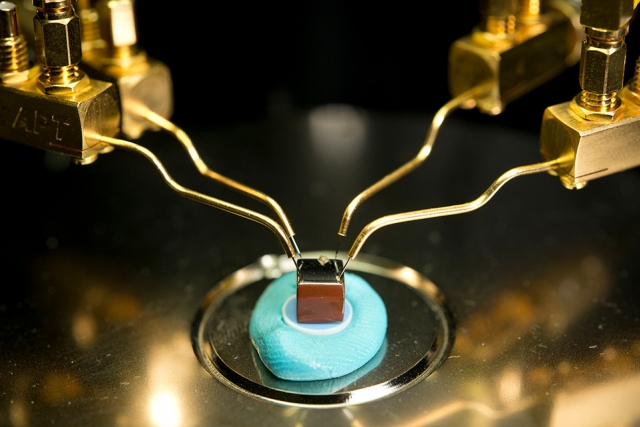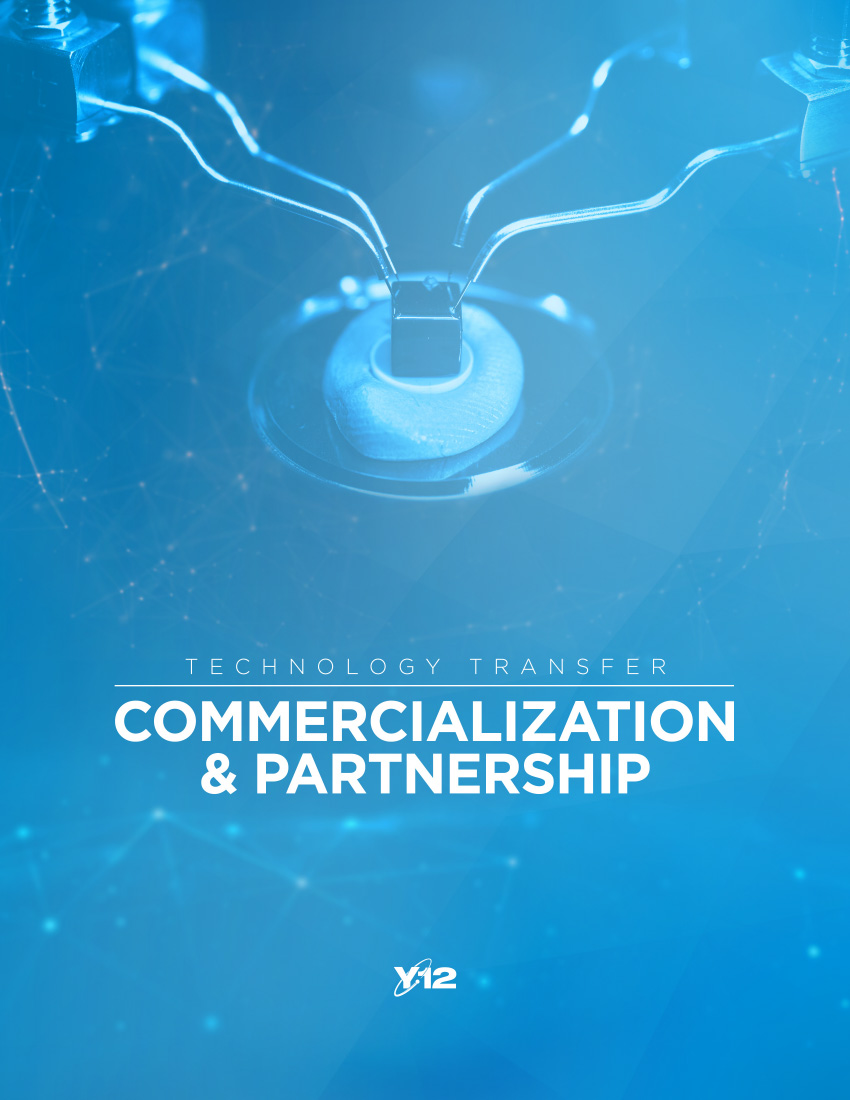Office of Technology Commercialization and Partnerships
OTCP@y12nsc.doe.gov

The R&D 100 Award-winning LISe™ Crystals were developed by researchers at the Y-12 National Security Complex. The Li-containing compound semiconductor thermal neutron detector is based on the
Licensing Opportunities
In the course of its work for the Department of Energy (DOE), Y-12 develops useful new technologies that have commercial applications. Through licensing, Y-12 transfers commercial rights for these technologies to the private sector. The technology transfer process can short-circuit the lengthy and costly product development cycle, and provide the licensee with a significant competitive advantage in the marketplace.
Technologies Available for Licensing
Technologies and software are available to license from Y-12. The Technology Transfer Commercialization and Partnerships Book features fact sheets detailing CNS-developed technologies available for partner collaboration and commercial licensing. The book also includes a guide to partnership opportunities, which details a variety of ways universities, industry, and government agencies may partner with CNS.
Technologies available for licensing are also available on DOE's Lab Partnering Service website.
Contact us if you have questions about these technologies or how to begin an application for a patent or copyright license.
Prospective licensees must complete the application for a patent or copyright license. Information provided by Y‑12 and the prospective licensee in this document is used for discussion purposes only; it does not constitute an offer or proposal by either party. Portions of the information provided in the application are protected by Y‑12 as business sensitive in accordance with legend printed on those pages.
From this information, the Office of Technology Transfer will propose a set of terms and conditions for licensing. Upon agreement on the basic terms and conditions of the license, the Office of Technology Transfer drafts the formal license agreement.
Upon approval of that document by the licensee, both parties execute the agreement.
All of Y-12's patent and copyright licenses require four types of payments:
- An up-front fee payable at the time of execution of the license.
- Reimbursement of patent costs.
- A “running royalty” payable periodically based upon product sales.
- A “minimum annual” royalty, which is offset by running royalties if the running royalties meet or exceed the stipulated annual minimum.
The actual amounts of these fees are negotiable based primarily upon the fair market value of the technology, the degree of exclusivity granted, and commitments to commercialization made by the applicant.
After the license agreement is in place, Y-12 makes every effort to support the licensee's commercialization of the technology. Developmental support can be provided on a cost recovery basis under Strategic Partnership Project agreements or Cooperative Research and Development Agreements.
In addition, subject to the same constraints, employee researchers are permitted to consult with the licensee on their own time. All such arrangements are of course subject to any conflict of interest restrictions, the availability of the necessary resources, and the preemptive needs of DOE.
Partnerships
The Partnerships Program strategically aligns CNS mission-directed research with university, governmental, and industry partners to strengthen research and development (R&D) capabilities and accelerate technology development. These partnerships ensure innovative technologies and solutions mature and provide maximum value to the partner, CNS, DOE, and the National Nuclear Security Administration.
CNS establishes partnerships with universities, businesses, federal agencies, and national laboratories using the following contractual agreements.
CRADAs allow for collaborative R&D on problems of mutual interest. Under a CRADA, CNS and the partner may share scope responsibilities and cost (in-kind funds) or the partner may pay CNS for CNS expertise and execution (funds-in). The partner may negotiate exclusive commercial rights (or share in the rights if mutually developed) to license intellectual property covered under the CRADA.
SPPs allow CNS to conduct paid work for partners, such as solving problems, making prototypes, conducting product evaluations, or developing and implementing solutions.
University partnerships allow university faculty and students to collaborate with CNS researchers, enhancing CNS's ability to solve complex problems. CNS values these long-term, mutually beneficial alliances with university institutions whose existing research capabilities directly align with our mission.
University partnerships provide research and development opportunities for university faculty, students, and recent graduates, including Joint Assignment Agreements, internships/co-ops, graduate assistantships, and postdoctoral fellowships. These positions promote vibrant research efforts within unique scopes of work, strengthening and accelerating CNS technology development.
The University of Tennessee, Texas Tech University, and Texas A&M University have received the distinction of Key University Partners, demonstrating expertise in aligned research interests, strength in academic and research disciplines, successful working relationships with university faculty and administration, and extensive programmatic and research interactions supporting key CNS initiatives.
Contact us to learn more about CNS University Partnerships.
JAAs allow for the formal exchange of personnel, helping both organizations to accomplish long-term technology, business, and research goals.
The commercial rights to CNS-developed technologies may be licensed to private sector partners for sale, use, and/or other benefit to the licensee.
A bailment agreement is a formal technology transfer mechanism that allows for the temporary transfer of government property to support collaborative R&D opportunities.
An MOU is a nonbinding agreement between CNS and the partner that summarizes areas of mutual interest and potential cooperative efforts.
Contact us to learn more about opportunities for partnership.
Technology Transfer Ombudsman
DOE and Y-12 share a mutual objective to encourage programs that further departmental missions and transfer federally funded technologies into the marketplace for the benefit of the U.S. economy. We also share a strong interest in open lines of communication and the early identification of issues, complaints and disputes between the facilities and their existing or potential partners. The timely and effective resolution of technology partnership concerns and complaints at an appropriate level is a priority.
DOE has requested that each technology partnership facility appoint an ombudsman to whom the public, existing partners and potential future partners can voice concerns and seek resolution of disputes relating to technology partnership activities. For specific information about the role of an ombudsman, please visit the Technology Transfer Ombudsman Program webpage.
At Y-12, the technology transfer ombudsman is a senior official who reports to senior contractor management and who is removed from the actual day-to-day negotiation of technology partnership arrangements.
Y-12’s technology transfer ombudsman is:
Randy Dziendziel
Consolidated Nuclear Security, LLC
P.O. Box 2009
Oak Ridge, Tennessee 37831-8004
Office: 865-576-7028
randolph.dziendziel@y12nsc.doe.gov
Contact Us
If you would like more information, please contact the Office of Technology Commercialization and Partnerships.
OTCP@y12nsc.doe.gov
